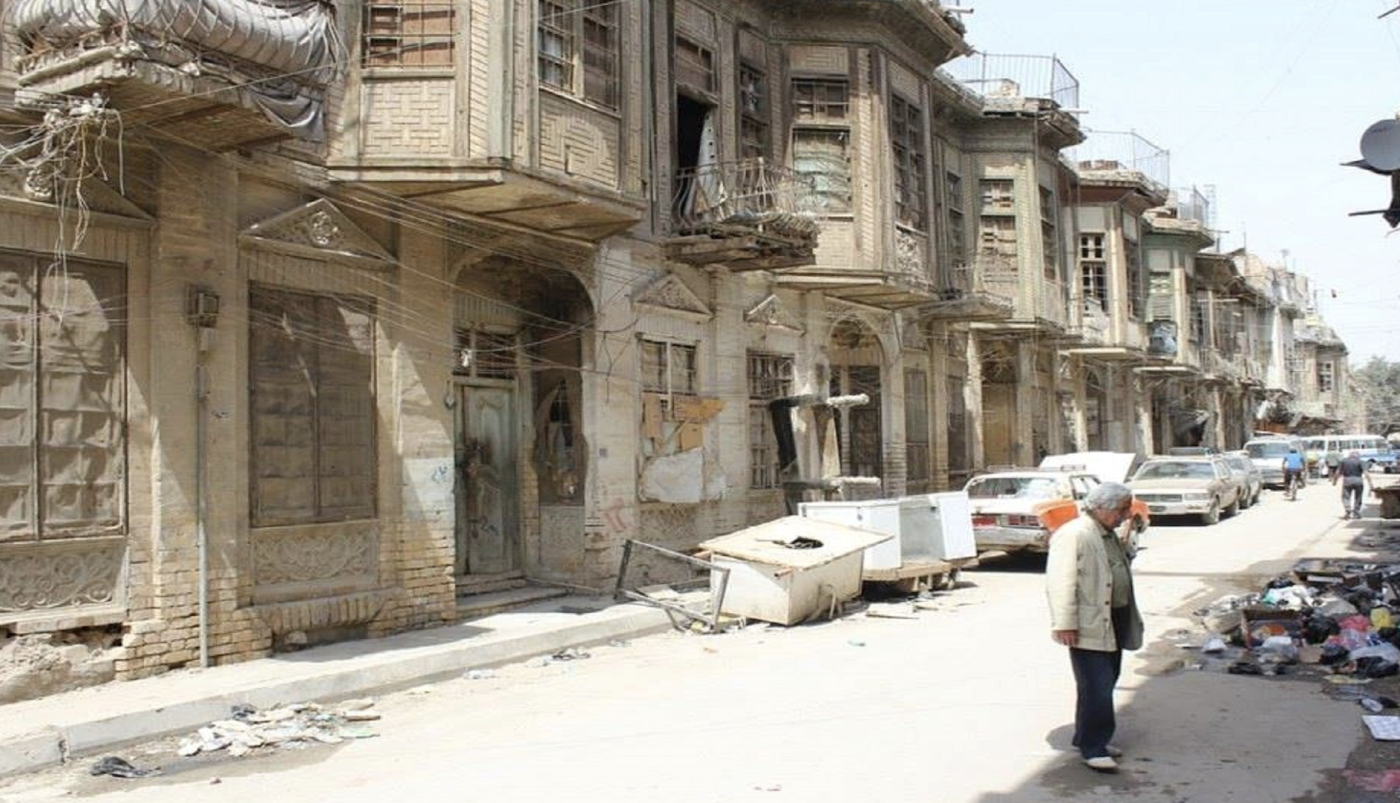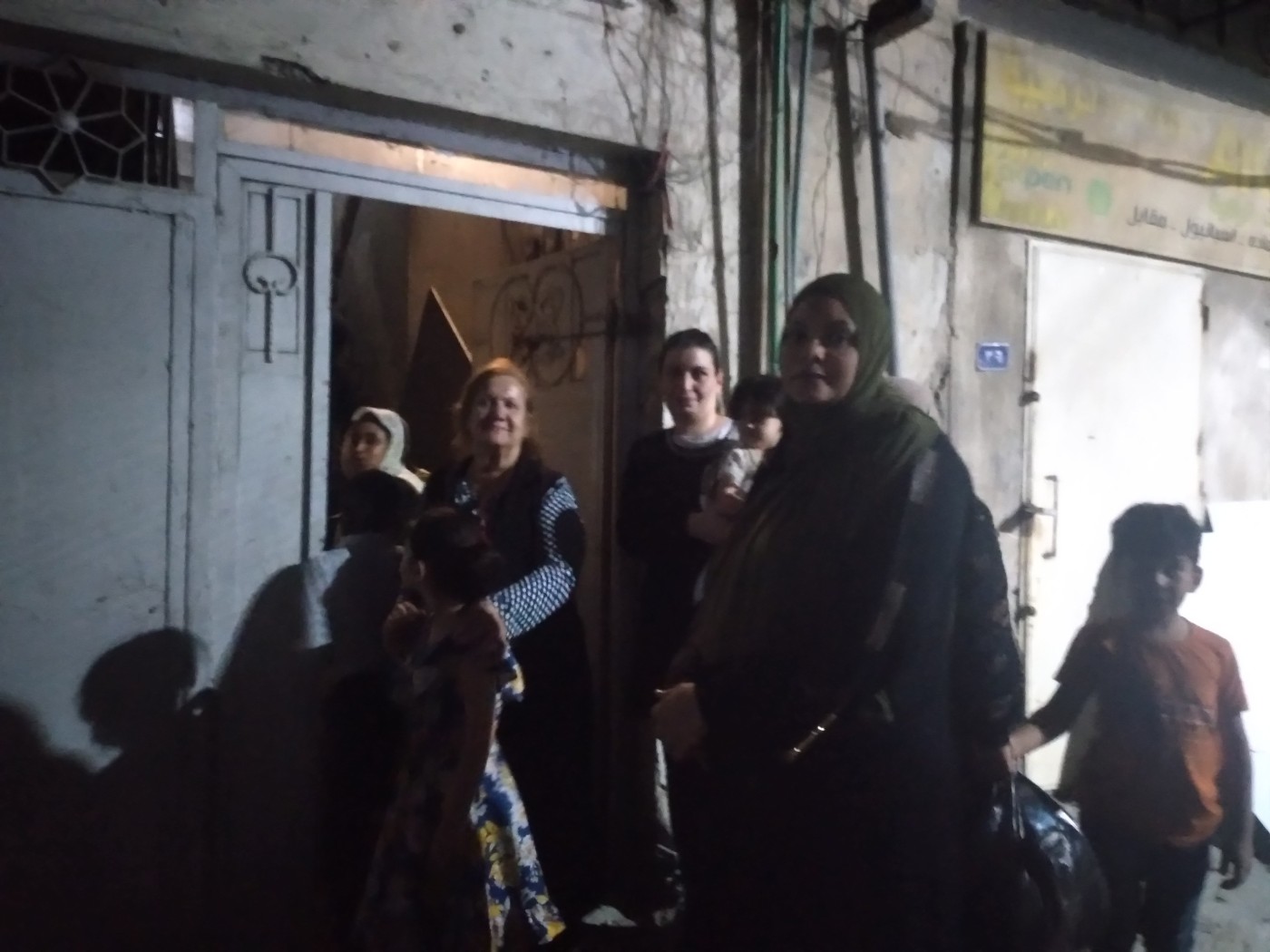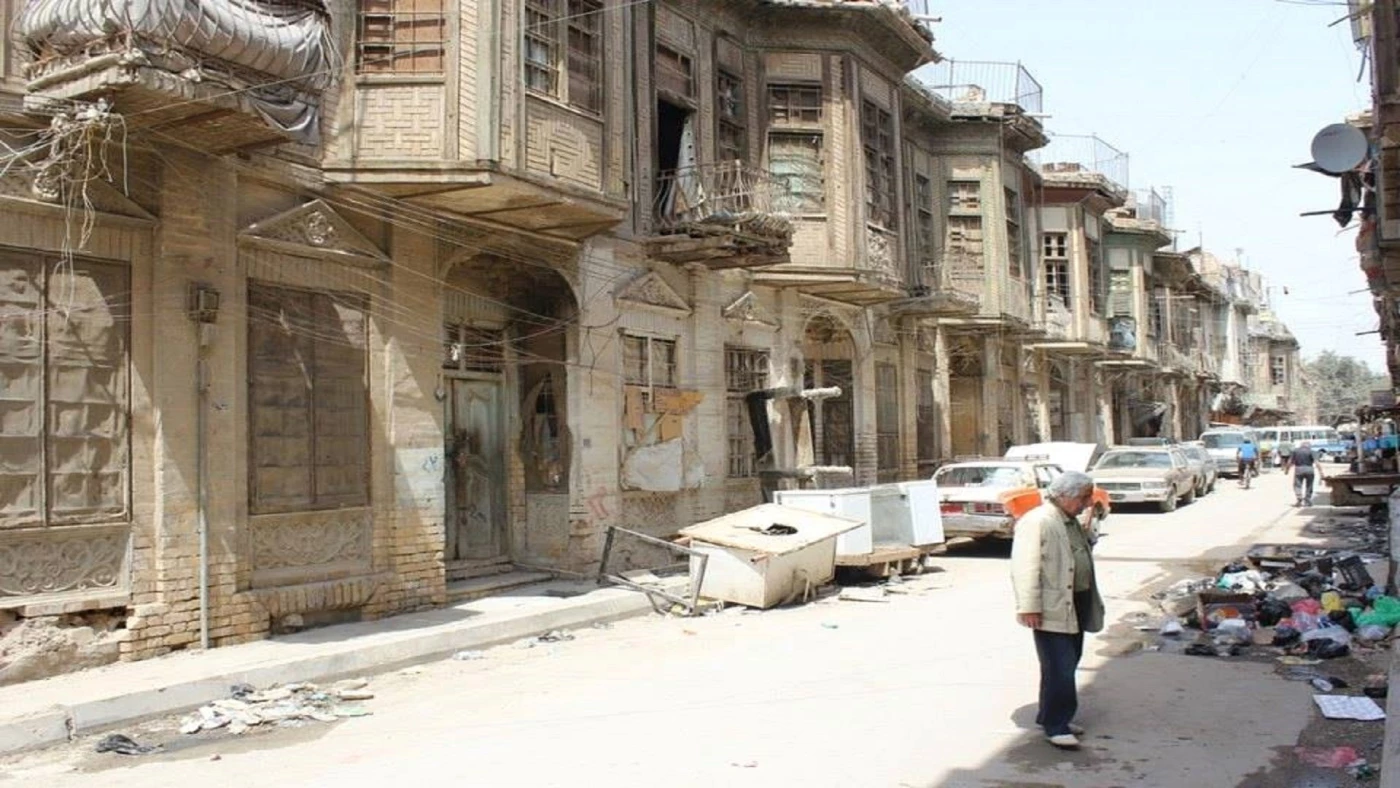"They took too long," says Ahmed Abdul Majid, a 54-year-old government employee who lives in Bataween, on the eastern side of Baghdad. He recounts the large-scale security operation launched by the Interior Ministry at dawn on April 25, 2024. The operation targeted organized crime gangs involved in drug trafficking, human trafficking, prostitution, and gambling, as well as hundreds of foreigners violating residency laws.
For nearly two decades, Bataween has been a sanctuary for gangs, addicts, and fugitives, according to Ahmed. He is astonished that the security forces have remained inactive for so long.
"We're just a short distance from the heart of Iraqi decision-making—the Green Zone, home to the government, parliament, and all the authorities," he says, talking to The New Region.
Ahmed explains that he never welcomed relatives into his small home in a Bataween alley. He also never allowed his children to leave the house after returning from school in the afternoon. "I feared for their safety and wanted to shield them from the nightly chaos—drunks, drug addicts, prostitutes, and more," he says.
While Ahmed remains skeptical about the operation's ability to fully eradicate gangs and illegal activities—citing a similar effort a decade ago that saw crime return—he remains hopeful. This time, he believes, the Interior Ministry might sustain its control and bolster its intelligence efforts to ensure lasting change.
In a press statement, the Interior Ministry reported that the Federal Police had conducted their first operation in Bataween in years, resulting in the arrest of 618 suspects, including several foreigners.
The Interior Ministry highlights the proactive nature of the operation, during which they dismantled organized crime networks, uncovered counterfeit industrial operations, and shut down fraudulent money transfer companies which operated both domestically and internationally.
Additionally, authorities seized illegal warehouses, medical laboratories, transport offices, and unlicensed hotels. The Ministry also discovered that gangs had illegally taken over numerous properties and homes belonging to locals.
The Interior Ministry has urged original property owners to bring their documents or proof of ownership to the Saadoun Police Station. This step will allow authorities to collaborate with judicial bodies to restore the properties to their rightful owners.
The “Reclaiming Bataween” operation, as some Baghdad residents have dubbed it, has garnered substantial support from social and cultural communities, given the area's historic homes and landmarks. Local residents largely welcomed the measures, though some believe the action came too late and questioned its long-term impact.
A young resident, identified as A.A., remarked, "They announced the arrest of more than 600 wanted individuals. It's shocking to think how many criminals were living and operating freely in the heart of the capital."
Crime hub
Decades ago, Bataween was considered one of Baghdad's upscale neighborhoods, where Jews, Christians, and Muslims lived side by side.
Over the past forty years, however, the area has gradually deteriorated, becoming populated by beggars, homeless people, and migrants from other provinces seeking job opportunities, as well as Arab immigrants. Since the 1990s, various gangs have established their hideouts in Bataween, spreading their influence throughout the neighborhood.
The area stretches from Orfali, home to Sudanese and Egyptian families who settled there in the 1980s, to the end of Zaeem Abdul Karim Street. Once a prestigious neighborhood, it is now primarily inhabited by the poor and middle class. The district is now lined with hotels of varying standards, particularly budget options, as well as numerous cafes and restaurants.

Interior Ministry spokesman Mekdad Al-Mousawi addressed the recent security operation in Bataween. "Since the 1980s, Bataween has become a hotspot for crime, its reputation plummeting due to weak security measures back then. But today, all that has changed."
He continued, "We've arrested 618 individuals, and there are still more suspects we will pursue. The area has been thoroughly cleaned up, numerous criminal networks dismantled, and property violations rectified. This is the first time such an extensive operation has taken place here."
Al-Mousawi admitted that previous security operations in the area had fallen short of their goals. "However, this operation is different because it is designed to be long-term. We have also invited popular organizations and unions to participate by holding public events, removing the area's moral decay, and clearing out all negative elements," he explained.
Security analyst Saif Raad Taleb noted that Bataween has largely transformed into a neighborhood of hotels and apartments occupied by workers from various nationalities, mainly Egyptians and Sudanese, attracted by the low cost of living and the proximity to Baghdad's primary commercial districts.
He observed that in the 1990s, when economic sanctions were imposed on Iraq following its invasion of Kuwait, Bataween became a sanctuary for theft and forgery gangs. "From the fall of the former regime in 2003 until the start of the latest operation on April 25, 2024, it was a haven for drug and crime gangs," he said.
The security analyst highlighted two main factors that contributed to the proliferation of these gangs in Bataween: "corruption" and the "affiliation of some of these gangs with political entities or armed groups that have influence over security and political decision-makers, or both," he explained.
He remarked that earlier security efforts in Bataween "only resulted in minor arrests and didn't tackle the core of gang activities. This time, however, there appears to be a stronger commitment to address these issues comprehensively."
Security analyst Saif highlights the strategic importance of Bataween, given its proximity to the Green Zone, the heart of Iraq's government, Shorja, the main commercial district, and the Central Bank. This, along with its tourist attractions, means the operation was essential and overdue. He suggests that future operations should target other crime-ridden areas like Fadhiliya and Al-Ma'amal on the city's outskirts.
A belated operation
Hassan Fad'am, a member of the Parliamentary Security and Defense Committee, criticized the Interior Ministry's security campaign as being long overdue, noting that it should have taken place years ago to "rid Bataween and other areas of crime and gangs."
"We fully support this security initiative and advocate for its expansion to other parts of the capital," Fad’am said. "Ensuring security in Baghdad is vital. Transferring security responsibilities to the Interior Ministry is a significant step forward. We are confident that the ministry, with the backing of national security agencies, intelligence, and the Popular Mobilization Forces, is capable of meeting the security requirements of Baghdad and its surrounding areas."
Abeer Al-Chalabi, Chairwoman of the Labab Foundation for Development and Human Rights and former Deputy Minister of Labor, made a visit to Bataween in 2010 while conducting research on street children for her doctoral thesis. She was shocked by the level of suspicion she faced.
"People asked me, 'What are you doing here? You look different, do you want them to kill you?' Others threatened me, saying, 'If you interfere in our affairs, we will kill you,'" Al-Chalabi recounts. "One peculiar woman even invited me into her home and, without hesitation, asked if I would work in prostitution for her along with other women."
Al-Chalabi believes the Bataween operation to be crucial, even if it is overdue. "Yes, the government should have taken action years ago, but it's better late than never. We can't leave the area as a haven for criminals," she says.
Writer Jamal Ahmed explains that Bataween had become a hub for drug promotion and distribution, with many users and addicts being local residents. "Drugs even made their way into the schools. There were also gangs selling human organs and trafficking girls for prostitution operating out of houses throughout the area."
Bataween, he notes, was home to "offices used for money laundering, and properties belonging to migrants, particularly Christians, were seized because they were too afraid to reclaim them."
To prevent Bataween from returning to its previous state and to stop the return of gangs that fled the area, Jamal stresses the importance of maintaining a continuous and effective security presence and strengthening intelligence efforts. "This way, security agencies can stay vigilant about any suspicious activities," he explained.
He urges authorities to restore properties to their rightful owners in Bataween, utilize vacant buildings, and demolish those beyond repair to prevent them from becoming "havens for criminals, beggars, addicts, and the homeless." He insists there is a need for a comprehensive rehabilitation effort by service ministries to revitalize the area and provide essential services.
These steps will "encourage current residents to stay and attract former residents to return, especially as the reasons for their departure would be addressed. After all, this is the heart of Baghdad."
Breathing easy at last
The New Region visited Bataween following the the security operation and noted that the streets were nearly deserted, with a significant presence of Federal Police vehicles and personnel. Attempts to interview hotel and restaurant owners were unsuccessful, later revealing that they had been instructed by the Interior Ministry to remain silent.
An employee at a budget hotel in the heart of Bataween, speaking anonymously, reported a noticeable decline in the hotel's revenue in the days after the operation. He explained that most of the guests had been foreigners, and the hotel had also served as a refuge for beggars due to its low rates. With many of these individuals now arrested, the hotel is almost empty.
He pointed out that hotels are not accountable for the backgrounds of their guests or whether they are wanted individuals; it is the responsibility of the security authorities to determine who is permitted to stay.
He believes that removing the "bad elements," as he described them, will improve the overall quality of the neighborhood, "particularly in terms of safety, which will encourage people to live, work, or visit as customers for shops, hotels, restaurants, and workshops."
"This is what should be expected of an area in the commercial center of the capital—it should be safe and bustling with business," he added.
The disruption to business in Bataween was apparent. Pharmacies, restaurants, grocery stores, and other shops are seeing a decline in revenues.
A source from the Interior Ministry says that this was anticipated, as many residents had temporarily relocated, awaiting the conclusion of the security operation. Some are waiting to see the final results. "This is just a temporary reaction, and Bataween will quickly regain its vitality," the source said.
Farhan Mansour Matir, a resident who lives in a small, dilapidated house, works by collecting cans and metal containers using a wooden pushcart. Speaking out despite security instructions, he praised the operation, stating it had cleaned Bataween of "drugs, prostitution, and gambling dens."
Gesturing around him, he says, "Before the security operation, this street was off-limits to people like us. We would have been robbed or killed by the armed gangs that used to control the area."
He explains that during his daily rounds collecting cans and metal containers, he always felt a constant fear: "Anything bad you can imagine happened here. Today, for the first time in years, I can walk around without fear or anxiety."
An aluminum workshop owner in Bataween, speaking on condition of anonymity, noted that most visitors to the area were from other provinces or even foreigners. He estimated that they made up about 50% of the area's patrons, attracted by the cheap hotels and the industrial nature of some streets, which are lined with various workshops, medical warehouses, and print shops.
He explains that the security operation has had a significant impact on his business. Road closures and entry restrictions now require residents to present a residential card and civil status ID or unified card, barring strangers from entering.
"We were suddenly hit with a tax hike to 725,000 dinars, up from 250,000 dinars. If I don't pay, they'll seal my workshop with concrete. How am I supposed to make a living when my customers can't get in?" he lamented.
He continues, striking a more optimistic tone, "Maybe things will get better over time. The area is now safe, and we can keep our workshop doors open until evening, which was nearly impossible just a month ago."
Nadera Tayef Sofi, a 65-year-old Christian woman living in Bataween with her family, stood at her door with several grandchildren and neighbors. She expressed relief, noting that the signs of corruption had vanished from the area, which she now believes is safe.

"Many Christians left Bataween because of the killings and kidnappings in previous years. But despite the dangers, I chose to stay because of my pride in my country, even after losing my husband." She gestures proudly, "I've lived here since I was born, in that house nearby which was my father's home, and I got married in this very house."
She smiles. "We couldn't go to church before because we were constantly harassed by drunks in the area. But now we can walk safely under the protection of the security forces." Raising her hands, she adds, "We hope this continues."
At the end of an alley, a seventy-year-old man emerges from the ruins of an abandoned house. Quickly, perhaps to dispel any suspicion about his presence, he explained, "It belongs to a relative of mine. I check on it periodically to prevent any issues."
"We have many memories here," he says. "We're deeply attached to this place and hope that Bataween can return to its former glory, like it was in the 60s and 70s, before it fell into ruin and became a haven for criminals."
He pauses for a moment, glancing at a nearby house that retains its traditional Baghdad facade with a small outer door and arched windows facing the street. "We don't know what they are planning. They say they will revitalize the area. We hope that's true, but we fear that some might take control and exploit it for private projects or turn it into blocks of residential and commercial buildings under the guise of reconstruction and investment."
* This feature was produced in collaboration with the Network of Iraqi Reporters for Investigative Journalism (NIRIJ)



 Facebook
Facebook
 LinkedIn
LinkedIn
 Telegram
Telegram
 X
X


